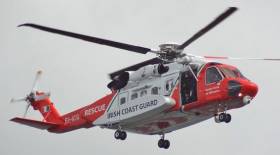Displaying items by tag: SearchandRescue
Irish Coast Guard SAR Service Using New S92 Helicopters Reaches 10,000–Hour Milestone
The Irish Coast Guard has achieved the significant milestone of 10,000 Sikorsky S92 flight hours in its Irish Search-and-Rescue (SAR). The five new technology Sikorsky S92 aircraft have completed more than 3100 missions, operating from the bases in Sligo, Waterford, Shannon and Dublin. With the introduction of the S92, the service ushered in a stepped change in operational effectiveness and flight safety. The fleet is equipped with state-of-the-art autopilot functions, auto hover and flight director upgrades. This has led to improved safety and higher levels of aircraft availability.
Chris Reynolds director of the Coast Guard said: ‘IRCG Search and Rescue helicopters operating out of four bases located across Ireland ensure that we continue to assist mariners, hill walkers, those living in rural areas and our islands communities”
Case Studies:
A significant percentage of SAR missions ensure critically ill people reach hospitals within the so called ‘golden hour’, giving them the best chance of a full recovery. For heart attack victims in rural communities, ensuring fast access to a specialist cardiac unit is vital. The speed and reliability of response is critical because the heart muscle starts to die within 80-90 minutes after it stops getting blood, and within six hours, almost all the affected parts of the heart could be irreversibly damaged.
When a pregnant woman living on an island off the Irish coast went into labour and found herself unable to get to hospital in July 2013, the SAR team were scrambled to take her to hospital. Impatient to make his/her arrival, labour was more advanced than initially believed and a baby boy was delivered by the crew’s winchman in the hospital corridor.
The waters around Ireland’s coastline can be both beautiful and wild. SAR Ireland’s crews have completed many missions miles offshore in some of the most challenging conditions. Here are two examples of a single night’s work.
· The 18th of September 2015 was a very busy shift for the crews of Waterford Rescue 117 (R117) and Shannon Rescue 115 (R115). Rescue115 was tasked by the Irish Coast Guard Station MRCC Valentia to Vessel Hanjin Cape Lambert approximately 170mls SW of Castletownbere, for an injured crewman. Due to the distance of the mission, R115 routed to Castletownbere refueling helipad. On arrival at the helipad, Rescue 115 was retasked to a more time critical medevac approximately 240mls SW Castletownbere to evacuate a 72 year old female with a suspected heart attack from cruise vessel Regal Princess. Rescue 117 (Waterford) was subsequently tasked to the Vessel Hanjin Cape Lambert. Rescue 115 lifted and met the Regal Princess 180mile SW Castletownbere. A Rescue 115 winchman was deployed to the vessel to assess the casualty’s condition. A Hi-line and stretcher technique were used to recover winchman and casualty back to the helicopter. R115 departed for Cork where the casualty was handed over for transfer on to Cork University Hospital.
· A crewman aboard a container ship about 100 miles off the coast of Ireland took ill recently and required medical evacuation. Two of Ireland’s Coast Guard helicopters were tasked in the long-range mission to the MV Atlantic Cartier and removed the man from the ship as he was suffering from chest pains. The Waterford-based aircraft (Rescue 117) reached the ship, located about 100 miles from Fastnet Rock, with the helicopter from Shannon (Rescue 115) providing top cover. The Irish Coast Guard Rescue Coordination Centre (RCC) in Valentia, Co Kerry, which coordinated the rescue, said the man was taken to Cork Hospital where he made a full recovery.
























































